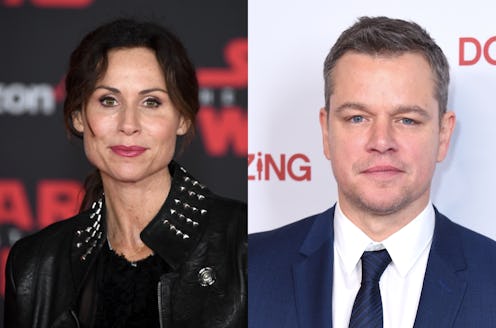Entertainment
Minnie Driver Slams Matt Damon for His #MeToo Comments — And This Isn't The First Time

Minnie Driver did not mince words in a recent interview about sexual harassment in Hollywood and beyond. During the filmed conversation on Tuesday with the New York Times, Driver dragged Matt Damon for his #MeToo comments that he had made previously. She explained exactly what she thought about Damon's opinions on the matter, but also detailed the ways she believes men can be allies in addressing sexual misconduct.
Damon landed in hot water last December for comments he made in an interview with ABC News that covered the allegations against Harvey Weinstein, Louis C.K., and other men in the industry. "I think it’s wonderful that women are feeling empowered to tell their stories, and it’s totally necessary," Damon said, but the comments didn't end there. He continued,
"I do believe that there’s a spectrum of behavior, right? And we’re going to have to figure — you know, there’s a difference between, you know, patting someone on the butt and rape or child molestation, right? Both of those behaviors need to be confronted and eradicated without question, but they shouldn’t be conflated, right?"
In her interview with the Times on Tuesday, Driver, who dated Damon 20 years ago after she played opposite him in Good Will Hunting, offered this zinger about Damon: "[He] represented every intelligent, nice white male who feels it is their job to comment on the way that women metabolize stuff.” (Bustle reached out to Damon’s rep for comment on Driver’s remarks, but did not receive an immediate response.)
Driver's recent observation is that Damon appears to be missing the point of the #MeToo movement, which is looking to end a systemic problem that includes all forms of harassment and assault, regardless of the legal extremity. And yes, this is a point she's made before. Shortly after the aforementioned Damon interview was published, Driver responded on Twitter. After tweeting out an article with his comments, she wrote,
"Gosh it's so interesting how men with all these opinions about women's differentiation between sexual misconduct, assault and rape reveal themselves to be utterly tone deaf and as a result systemically part of the problem."
She wasn't done with her hits on the topic. A few days later, she told The Guardian that men "simply cannot understand what abuse is like on a daily level." She explained that she believes that nobody, man or woman, can tell somebody else how to feel about and react to their abuse. "[Abuse] is so individual and so personal, it’s galling when a powerful man steps up and starts dictating the terms, whether he intends it or not," she said.
Still, Driver does believe that men need to be part of the conversation on how to reconcile the outpouring of allegations. "There’s no way to move forward unless we do this together," Driver told the Times. She recommends a method similar to South Africa's Truth and Reconciliation Commission, a restorative justice system that was used after Apartheid to allow individuals and groups to report human rights violations and injustices committed under the previous system in a court-like setting.
Under this system, Driver said, “Women get to be heard." She added, “You get to be seen and heard, and the accusers get to hear that and get to metabolize that, and then there is due process and then there is healing.”
While we might not see a wide-scale restorative justice program arise from the #MeToo movement, Driver's point that it's time to listen to women is a strong one. As more people begin to understand the problems caused by harassment and abuse, then more can be done to stop this injustice from happening in the future.
If you or someone you know has been sexually assaulted, call the National Sexual Assault Telephone Hotline at 800-656-HOPE (4673) or visit online.rainn.org.